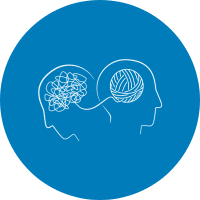Depression and Mood Disorders
Not sure if you need help?
Right Medication
Personalized Treatments

Psychiatric Medication
Based on the results of your rEEG*, our medical staff will identify the most effective medication regimen for you, which may include antidepressant and other medications.

Psychotherapy
Each psychotherapy method works in a slightly different way, but all have been proven to help improve the symptoms of depression. If there is a type of psychotherapy that appeals to you, we can create a treatment plan that includes your preferences.

Ketamine-Assisted Psychotherapy
If you have a major depressive disorder and have tried at least two antidepressant treatments, you should consider Ketamine. Because this treatment is altering the brain to be re-wired to function differently, the treatment will provide a different result than what you’ve experienced in the past.

Transcranial Magnetic Stimulation (TMS)
TMS is approved by the FDA to treat depression. TMS causes more connectivity between nerves in the brain, an increase in the amount of neural activity, and an increase in the number of neurotransmitters like serotonin. The increased activity of neurons in this area of the brain lessens depression.

Diet and Lifestyle
Dieticians, consultants and group therapy provide help with dietary and lifestyle modifications, healthy living, yoga, exercise, natural supplements, and more. These programs complement psychological treatment to alter one's response to depression.

Meditation and Relaxation
Mindfulness meditation and somatic exercises like Restorative Movement can be effective methods in rebalancing and restoring the body's chemistry.
Based on your specific needs and diagnosis, we offer comprehensive and effective programs to help you find relief now and into the future. They include a continuum of care from outpatient to intensive patient, partial hospitalization programming to supportive housing.
Intensive Outpatient Program (IOP)
Personalized and multidisciplinary IOP programs are designed to address mental, emotional, physical, and spiritual needs. In-person, virtual, and hybrid sessions are available for those needing greater flexibility.
3 Day IOP
Includes a minimum of 10 hours of treatment per week, comprised of six or more 90-minute therapy groups.
4 Day IOP
Includes at least two additional group therapy sessions of three hours or more.
5 Day IOP
Includes a minimum of two group therapy sessions or three hours of therapeutic treatments per day.
Includes:
Individual psychotherapy sessions minimum once per week
Psychiatric medication prescription and management
Family sessions (generally bi-weekly)
Case management services of up to two (2) hours per month.
Family work, parent consultation
Psychological testing
Partial Hospitalization Program (PHP)
The PHP program provides intensive support without 24-hour supervision. As an alternative to a hospital or residential program, PHP offers comprehensive, short-term treatment with a complete team of clinicians under one roof. The full-day program is attended 4–5 days a week.
Conditions Addressed
Depression, Anxiety, Bipolar & Other Mood Disorders
Borderline & Other Personality Disorders
Substance Dependence & Co-occurring Disorders
Trauma & PTSD
Interpersonal Conflict
And More
Services Provided
Individual Psychotherapy
Family Therapy
Case Management
Group Therapy
Psychiatric Intervention: Medication, TMS & More
Supportive Housing*
Group Therapy
Learn about coping strategies to reduce anxiety symptoms and gain a better understanding of the thoughts, feelings, and behaviors that perpetuate anxiety—all within a caring and supportive environment.
What You’ll Learn
Effective social skills
Anxiety management skills
How to develop an understanding of others
Communication skills
The steps toward positive growth
How to define and create a path to achieve your goals
What You’ll Gain
A deepened self-awareness
Improved relationships
Structure for daily, short-range, and long-range commitments
New effective and creative life skills
Emotional stabilization and symptom reduction
The ability to identify the next step
We’re dedicated to providing valuable information and support for anyone who is struggling with mental health issues. Our extensive options for group therapy are led by highly experienced medical professionals. Explore our informative articles to help you better understand and manage your anxiety. Our goal is to provide a safe and supportive community where you can learn, connect, and grow.
Group Therapies
Discover our group therapy options, specially designed to equip you with essential skills and tools to manage your well being for the long term. Our sessions are led by a team of highly-qualified and experienced professionals committed to providing you with the highest quality care.






